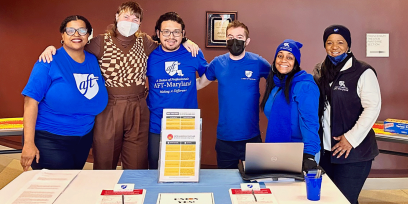It’s been years in the making, with efforts that included countless trips to the state Legislature as well as the usual member outreach, but faculty at Prince George’s Community College in Maryland have officially joined the union. That means they are now part of the largest higher education union in the country and the fastest-growing union on campuses in the state—where PGCC is the third college to join United Academics of Maryland this academic year.
After filing with the Maryland Public Employee Relations Board on Feb. 12, the union was certified Feb. 21. The 220 new members are part of United Academics of Maryland, which is affiliated with the AFT, AFT-Maryland and the American Association of University Professors.
“Faculty here on campus are extremely excited because they feel as if this is the only way to be able to have a say in what goes on here at the campus,” says Jonn Mack, an assistant professor and academic coordinator for the paramedic program at PGCC. The union plans to address issues including fair compensation, equitable working conditions and opportunities for professional development. Members will also have a voice on campus to shape policy that directly affects their students.
“Having a seat at the table and being able to provide supports to our students is most important,” says AFT-Maryland President Kenya Campbell. “Unionizing, having a seat at the table, will ultimately allow our students to have the best education that they can have.”
For years, community college faculty in Maryland were barred from forming unions. But after persistent advocacy on the part of AFT-Maryland and others, a change to state law was passed in 2021 that allowed faculty at the state’s 16 community colleges to unionize beginning in 2022. Education and union advocates are continuing to fight for the right to organize at four-year colleges as well.
Meanwhile, two other Maryland community colleges have also joined the union. This past August, faculty at Howard Community College, with a total of 170 faculty, and Frederick Community College, with 100 faculty, petitioned the state to recognize their union; they were officially certified in September. Full-time faculty at Montgomery County Community College are also affiliated with AAUP-AFT.
Unionizing community colleges is especially important as these institutions provide a powerful vehicle for social mobility. As more affordable, more accessible schools, a large percentage of the students they serve are low-income, including many who are the first in their families to attend college; they also typically welcome more Black, Indigenous, Latinx and other students who are otherwise underrepresented at four-year colleges and universities. Faculty and staff at community colleges face the same challenges as their peers at four-year colleges, but the problems are often magnified, with lower pay and little respect for their work.
Faculty simply want to advocate for better working conditions—and better learning conditions. With a union they can do just that. “Most people here on campus know me as a troublemaker, but I only make good trouble,” says Jonn Mack. “People call me problematic in the administration, but that’s because I identify problems and we try to solve them. But now, they can call me unionized.”
[Virginia Myers]

